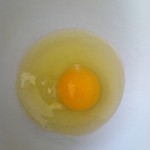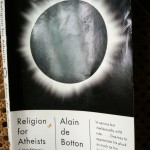Separating an Egg, Bathing a Baby, and Looking at Religion in Parts
A couple of mornings ago, my daughter asked me to scramble her some eggs without the yolks. She had just had her wisdom teeth taken out, and hunger was beating at her door. But she was not too groggy that she didn’t remember her food rules. I followed her instructions; what resulted in the frying pan looked ridiculously pale to me, almost not even like food, actually. Whatever—she ate it. In this instance, it was more or less OK to separate things that usually stay together; how about as a general practice, though? When is picking and choosing a perfectly fine thing to do, and when does it veer into being, well, insulting?
It just so happens I’ve been reading a book with an entire premise about how we can, and indeed should, leave out the “bad” parts of something and still have a full and satisfying meal with the “good” parts. I am absolutely not forgetting to use quotation marks here. Bearing the intriguing title, Religion for Atheists, the paperback found its way into our household through the gift route. (I’ve learned through the years that people like to give my husband books a lot.) If this paperback were going on your bookshelf, you might put it next to Exotic Cruises for Stay-at Homes or Fabulous Meat Entrees for Vegetarians.
The book has a dramatic cover— an almost complete solar eclipse, I think. It’s anyone’s guess, but I’ll speculate that Alain de Botton (a French name, but he lives in England— another jarring contrast) chose an image to depict how we can still have some of the radiance of the sun without taking it whole hog exactly…and of course we’ve always been warned against looking directly at the ball of fire in the sky anyway. To me, though, this picture looks kind of creepy.
He levels with us in the beginning of the book about what, in his view, must be tossed out from any religion. Anything smacking of “doctrine” or “the supernatural” goes right in the compost, almost without any explanation, as if it’s just so obvious. What he’s most interested in is saving the good stuff, showing non-believers which elements of religion are really worth something, and why. We can learn a whole lot, he argues, from seeing how various faiths have, through the ages, nourished things like community, education, and art— just to name a few. And, if secular society got its act together, we could even appropriate much of what religion does best to slake the thirst of our culture without succumbing to a whole bunch of beliefs that really don’t hold water. This would be, then, kind of like a kid on a playground who watches a game played by other kids; s/he doesn’t ask to join them but maybe takes their ball later when they’re not looking and starts a new game.
So, for instance, we might initiate something called an “Agape Restaurant” in our towns to bring together, in an intentional way, different kinds of people for supper conversation and fellowship. Since everyone can also benefit from a daily dose of transcendence, here is his suggestion for how we might find that:
Thus we would do well to mediate daily, rather as the religious do on their God, on the 9.5 trillion kilometers which comprise a single light year, or perhaps on the luminosity of the largest known star in our galaxy, Eta Carinae, 7,500 light years distant, 400 times the size of the sun and 4 million times as bright. (p.202)
I’m not sure what to make of this. In a way, I’m sympathetic, even a participant. As someone who encountered the world of organized religion coming from “the outside,” I have found myself weighing which elements I like most and which ones just don’t adhere. In conversations with myself, I have tried to find a comfort level in certain situations that keep arising. This process is sometimes stimulating, sometimes pretty difficult. Or, as my kids might say, “AWKWARD!” I want to fit in rather than stand out, and yet I can’t help but listen to my inner voice, too.
On the other hand, I squirm when this author thinks he can just come into the Religion Room and take a whole bunch of items he needs, and then leave. “Not so fast, mister!” I want to say, “People have built all of this up over centuries….make your own beautiful things, why don’t you?” I feel a little like the Julia Louis-Dreyfus character in that recent movie, Enough Said, when she’s irritated at the James Galdofino character’s habit of picking out the tomatoes from his guacamole. (In a way, though, that’s kind of the reverse– isn’t it?) Furthermore, maybe the beautiful things we seek never only “belonged” to religion, it just sometimes seems that way.
Years ago, in my high school Calculus class, our teacher had a favorite expression when he was trying to explain where we went wrong in a problem. Let’s say Gary had just written out all of his equations on the board, but there was an error.“Gary!” Mr. Courten would exclaim, pumping both hands up and down, “You’re throwing the baby out with the bath water!” This is the kind of thing a teacher says that sticks with you through the years, much more than Calculus…alas.
When I went to Wikipedia to learn more about the origin of this charming expression, I found that it sometimes describes really weird human behavior:
In other words, the idiom is applicable not only when throwing out the baby with the bath water, but also when someone might throw out the baby and keep the bath water.
If we start doing things like this, then we would go beyond insulting to being downright deranged. And our secular culture would be one fine mess. All’s I know for sure is that it’s best to pay close attention to what I’m saving, at any given moment, and what I’m not. Hey, maybe the dog would like those yolks?






Hey Polly: It’s funny, I’ve actually recommended Religion for Atheists to a couple of people, and took from it very different lessons than you note. One might instead say that various religions have used (or maybe understood) basic human characteristics and emotional needs, and THEN figured out (over time, for sure) good ways to codify it into specific actions or rituals. So instead, it’s maybe a method by which secular people could find a way to recapture what isn’t necessarily religious by nature, and understand that parts of it are not only useful, but humanistically (not necessarily religiously) enriching. The “baby with the bath water” is a good analogy, and the question is then just figuring out what you consider to be the “baby”. For me the “baby” is the human understanding, for others the “baby” might be their god or religion. I think it’s fair to say that both “babies” are valid – that’s where personal choice or belief comes in. Back to your egg analogy, you could almost look at it as “which came first, the human instinct, or religion?” Thanks for the thought provoking.